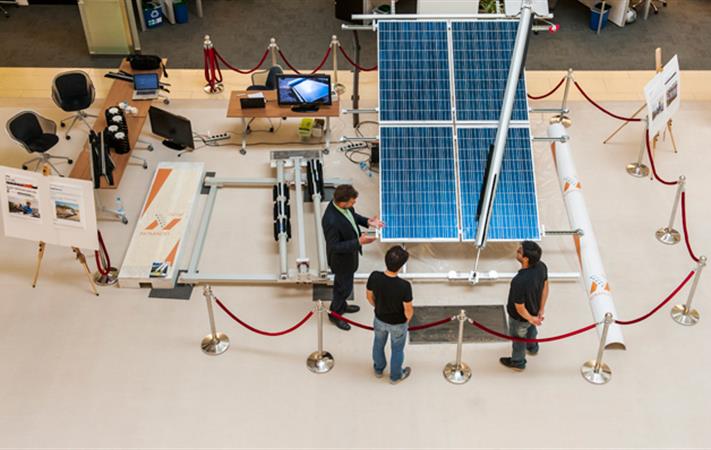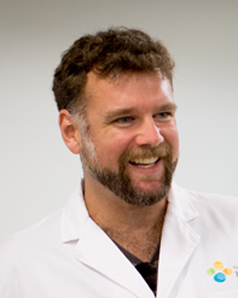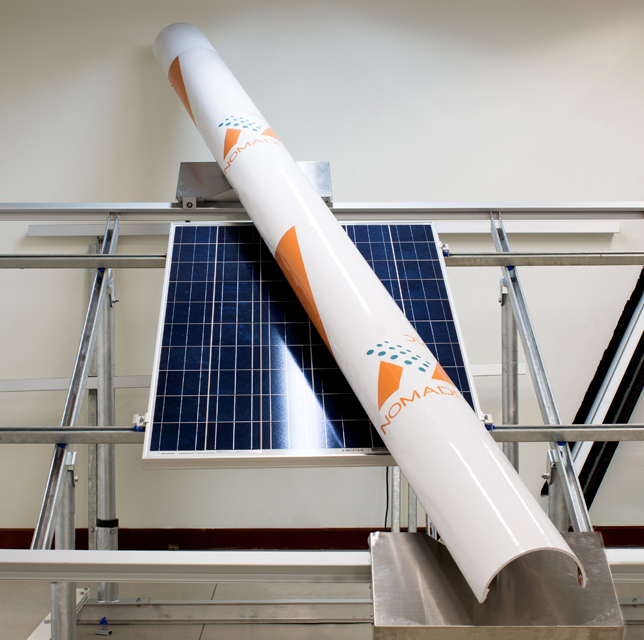NOMADD sets sights on solar energy future

The NOMADD technology represents KAUST's first royalty-bearing license agreement.
The United Nations estimates the Saudi population will grow to 45 million by 2050; and as the population increases, domestic energy demand is anticipated to double by 2030. In recognition of the growing importance of developing sustainable and renewable energy sources for the Kingdom, the Saudi government has established the ambitious goal of generating a third of the country's electricity sources (41,000 megawatts) through solar power by 2032. Towards this goal, the King Abdullah City for Atomic and Renewable Energy (KACARE) aims to construct a $109 billion solar industry in Saudi Arabia, which would represent about 20,000 football fields worth of solar panels.
"We hope to be the industry standard solution to clean all those panels," said Georg Eitelhuber, Founder and Chief Executive Officer of NOMADD. The startup company, developed three years ago at KAUST and originally supported and funded by the Entrepreneurship Center and the Seed Fund program, offers a waterless and remotely operated system to clean solar panels. The acronym NOMADD stands for NO-water Mechanical Automated Dusting Device.
Describing the challenges facing Saudi Arabia's burgeoning solar energy industry, the NOMADD founder says: "The big challenge, is dust. Desert winds pick up the dust and push it onto the solar panels, all day every day. Sometimes you can have dust storms which put so much dust on the solar panel surface, you can lose 60% of your output in a single day." Actually, solar panels lose between 0.4-0.8% of their efficiency per day just from desert sand and dust.

Georg Eitelhuber, Founder and Chief Executive Officer of NOMADD.
Eitelhuber is grateful for the backing of KAUST, with all of its resources, in assisting inventors like himself. As the NOMADD team works with various industrial testing partners on improving the technology, KAUST Tech Transfer is there to maintain control of patentable technology which may emerge in the process. A milestone was achieved last month when KAUST signed its first royalty-bearing license agreement for the NOMADD desert solar solution system.
A Continuous Drive for Improvement
Demonstrating the newly devised fifth version of the NOMADD system in its three years of development, Georg Eitelhuber explains that it's now "70% lighter than previous versions and uses less than half of the power." In addition to that, it's much cheaper to manufacture.
"Every time we do a new version it's simpler, cheaper and faster," he adds. For example, the rail system supporting the brushes cleaning the solar panels from top to bottom is not only lighter and cheaper but it also now just clips on – whereas previous versions required many nuts and bolts. The mounting system moreover features an inbuilt self-adjustment process tailored to determine the optimal gravity-adjusted angle as the solar panels are cleaned.
It's important for the cleaning system to be both economically and functionally optimized since some panel rows can be 400 meters long. "That's a lot of rail," said Eitelhuber." "The old version had literally hundreds of nuts and bolts, little fasteners and washers and it worked great but it also weighted as much as a tank."
Compared to some earlier models, which had around 120-odd manufacturing pieces, the latest NOMADD system has narrowed it down to 10 to 15 pieces. This means that it's now easier to manufacture and assemble. "The key thing is that it has to be cheaper than sending out a worker with a squeegee and more economical than anything else in the market," he adds.
The achieved objective has been to make NOMADD desert-proof – as the arid environment causes things to break down at higher frequencies. The device is basically machined aluminum and stainless steel.
It's also noteworthy that the brushes used to non-abrasively clean the solar panels can easily be slid out and replaced. So it would take someone around five minutes to change all the brushes.
In addition, one of the major advantages of the NOMADD system is that it's remotely operated. The cleaning functions can be monitored and operated online from around the world.

Compared to some earlier models, the latest NOMADD system is now easier to manufacture and assemble.
A Saudi-Specific Innovation with a Global Footprint
"The advantage that we've got is that we've basically been three years in development and we've been developing this solution for the desert while being in the desert. We've got a real understanding of the issues involved in cleaning solar panels in the desert," said Georg Eitelhuber.
Unlike some other solar panel cleaning solutions from North American and European companies, designed for mild climates, that use water and require manual labor, the NOMADD system really has an edge by being a waterless model ideally suited for these arid conditions. "We understand that having someone standing outside at 45 degrees Celsius cleaning solar panels eight hours a day isn't feasible," he adds.
As they keep an eye out for the competition, the NOMADD team is confident that, once they make it through the final development process, they will have every chance of being a huge commercial success.
KAUST's director of New Ventures and Entrepreneurship, Gordon McConnell, says NOMADD's local presence in the Kingdom will help contribute in building a knowledge-based economy in Saudi Arabia. "The local incorporation is not just of bureaucratic significance, but will now enable NOMADD to develop its business which in turn will help to create high level jobs in sales, marketing and technical areas, while also offering an opportunity to build up local manufacturing capacity and it will make it easier for fund raising within the Kingdom," said McConnell.
The NOMADD project has greatly benefited from the collaborative efforts of several key team members such as Guodong Li, Chief Electrical Engineer, and Elizabeth Cassell, the project's chief Administrator, both from the KAUST Solar Center; as well as Head Mechanical Design Engineer Steven Schneider who has been instrumental in producing technical drawings for manufacturing. Andres Pablo, a Ph.D. student, and Razeen Stoffberg, one of Georg's ex students front the KAUST school, have been assisting with technical setups and product testing and evaluation.
Also, as much of the manufacturing work is done in Asia, the NOMADD team has set up an office in Singapore, headed by Chief Development Officer Cliff Barrett. As a next step, the team has been actively recruiting a new CEO to help the project achieve critical mass and reach their ambitious future milestones.
"Thanks to some great mentorship from the KAUST New Ventures and Entrepreneurship team, I've done my best as a CEO but I'm an engineer and an inventor by nature," said Georg Eitelhuber. "It's been one of my dreams from the very beginning to try and start something which will have a net positive environmental and social impact."
By Meres J. Weche, KAUST News

